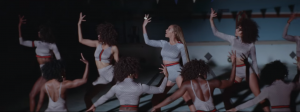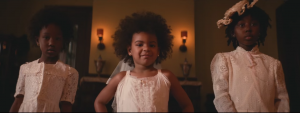By Alexandra Werner-Winslow
BU News Service
Since Beyoncé’s video for “Formation” dropped almost a month ago on the anniversary of Trayvon Martin’s death, it’s sparked a fierce racial discussion.
The video would have been enough, but then Beyoncé performed her single at this year’s Super Bowl in a Black Panther-themed costume. Members of the National Sheriffs’ Association subsequently turned their backs on her, and we were pretty much off to the races.
The one thing that everyone seems to agree on is that “Formation” is not just black: it’s recklessly black. That’s how Zandria Robinson put it in an essay she published just a day after the video was released, and that’s what has infuriated and delighted so many viewers — there is not a scrap of meekness in that entire song; not a hint of apology.
I’m neither black nor from the Deep South, so “Formation” isn’t really meant for me. Yet every time I rewatch it (which is daily), I can’t help but see myself, obliquely, in Beyoncé’s performance of Southernness. It’s another essay entirely, one that Jesmyn Ward wrote for NPR’s Codeswitch, that helped me figure out why: Ward sees Formation as a theme song for the South.
“For those of us who buy Camellia red beans and creole seasoning and Louisiana hot sauce and White Lily flour when we visit home, and then are a little disappointed when it cooks differently in the high, thin air where we live,” she writes.
“[For those of us who] still live in those other places, when the living heart of us is bound so tight with oak and pine we can barely breathe. For those of us who write our stories or sing our songs about the South, who are told over and over that there is no audience for our art.”
To be clear, Ward is describing (so poetically it makes me tear up if I’m not ready) a kind of black South I could never know. My South looks a little different. Let me be the first to tell you that I don’t buy Camellia red beans or creole seasoning; that the only reason I buy Louisiana hot sauce is because of my parents’ years in New Orleans, not mine. That even my loyalty to White Lily flour is courtesy of my Alabaman boyfriend and not my mama, who uses King Arthur.
I know that puts me outside the scope of “Formation’s” intended audience, and makes my reaction to the song all the more audacious. But the crazy thing is that I do see myself in this video, just as I do see myself in Ward’s essay, even if what I’m stocking up on when I visit home are Virginia peanuts (the South’s best, and don’t you try to tell me different).
Ward manages to articulate — as have a number of great writers reacting to “Formation” — the gut-level shame and simultaneous pride of being Southern, the paradox by which people pity you for where you’re from. Yet deep down, you pity them back for not being Southern.
“Formation” and Beyoncé’s performance act out the same defiance that I see in my Appalachian high school students in Eastern Kentucky, who know that their homes, their families, their culture are worth something. It captures every student I’ve worked with in Virginia, North Carolina, and Mississippi who hold their heads damn high. “Formation” even validates my own choice to root my home, my identity, and my life’s work in the South: I had other options, but none are as good.
“Formation” has problems – man alive does it have problems. Beyoncé has received criticism for profiting from the trauma of Katrina (a trauma she never experienced), and for literally appropriating the voice of New Orleans’ Messy Mya, who was shot and killed at 22. Not to mention the song’s love affair with the same capitalist system that has disproportionately disenfranchised black people.
Even the idea of women getting into formation is a little suspect, since the video more-or-less commands women to be performative and homogenous in the face of the male gaze, so there’s a lot to take issue with.
I get it. But I also know that “Formation” is unapologetic, and I can’t help but think that the South — that Southerners — have apologized enough. Even if it wasn’t meant for me, even if I can only respectfully acknowledge the ferocious, “reckless” blackness that Beyoncé performs, I can’t help it: “Formation” is a Southern anthem, and I’ve got it on a loop.







